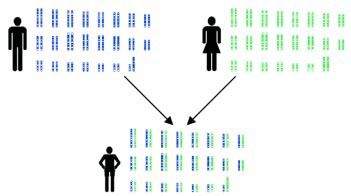
All of the genes in our bodies are made of a chemical called DNA (deoxyribonucleic acid). DNA is a chemical made of four kinds of building blocks, or bases: adenine (A), cytosine (C), guanine (G), and thymidine (T). These bases can be strung together in many different combinations to create unique DNA sequences. Genes are made of these sequences and contain the instructions for life. A small part of a gene might have a DNA sequence that looks like this:
ATTCTGATTTAAGCTA.
In total, humans have about 100,000 different genes that are grouped into small structures called chromosomes. People have 23 pairs of chromosomes, including a pair of sex chromosomes. Each pair consists of one chromosome that is inherited from the mother and another chromosome that is inherited from the father. The sex chromosomes contain genes that determine the sex of a person. Girls inherit two X chromosomes, whereas boys receive one X chromosome and one Y chromosome.
Because people have two versions, or copies, of every chromosome, they therefore have two copies of every gene. The DNA sequences of these genes are more or less the same in everyone. However, sometimes there is a difference in one person's gene sequence as compared to the majority of the population. This DNA change is called an alteration, or mutation. Some mutations may occur that do not interfere with the health of an individual. Other mutations disrupt the gene enough so it does not function correctly. Below is an example of a mutation in a gene associated with hearing. The base change from G to T is enough to alter the instructions contained in the DNA sequence.
... A G A T G A G C A ... Normal sequence = Working gene
... A G A T T A G C A ... Mutated sequence = Non-working gene
Gene mutations can be dominant or recessive. The Usher syndrome mutation is recessive. In this case, the altered gene is not strong enough to have an affect if a person also has one unaltered gene. As a result, an individual must inherit two altered genes, one from each parent, in order to be affected. The term carrier is used to describe a person who has one unaltered gene and one gene with a recessive mutation. This person is not affected but can pass on that mutation to his or her children. Because many Usher syndrome parents are carriers, Usher syndrome often appears in families with no history of Usher syndrome.







